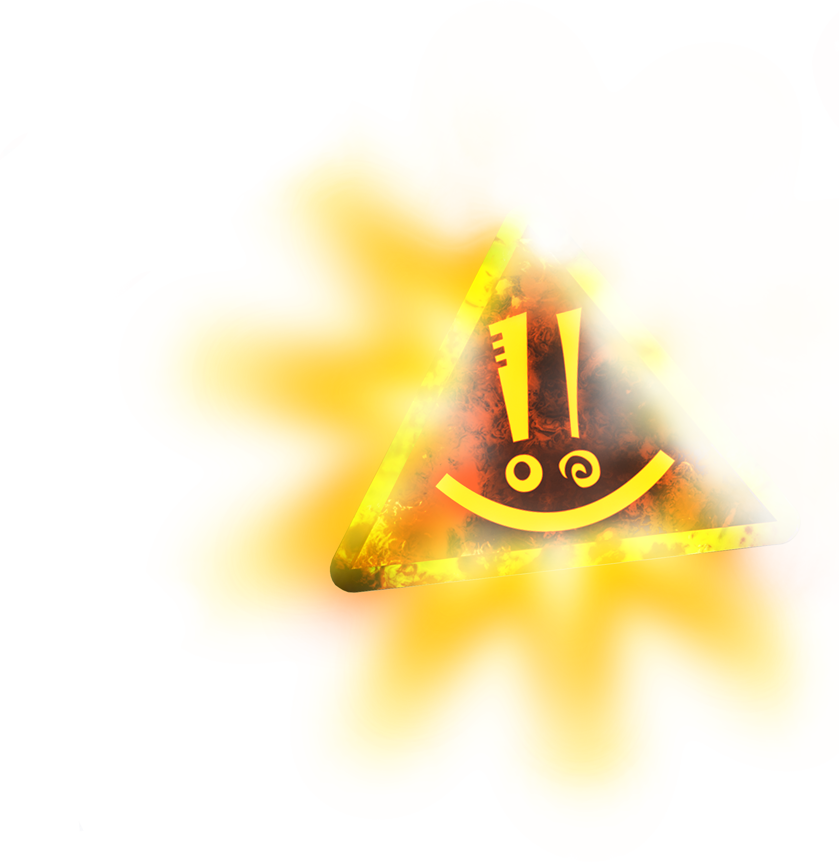How to find enlightment?
Turn on the light...
After a long walk with a heavy backpack you stop for a while. You throw the backpack away from you and at that moment you feel relief. Everything feels lighter without that backpack. You can also do the same with your mental backpack full of your history, your conscious and unconscious biases, identity, memories and worries about the future. If you need them, you can grab and take out your backpack, but you don't have to drag it everywhere.
But... Easier said than done!
Looking for enlightenment (rest in your head).
Think of your head (~thinking world) as an exotic cocktail. Sometimes sweet, sometimes sour, sometimes clear and sometimes a cloudy mess. Getting peace of mind is easy (but not easy), you just have to add nothing more and let your head stop for a while (meditate), or let it come to a standstill (and that takes time and oh how impatient we are !).
Just joking, keep it light
Oh wow, this is where it goes wrong. You aspire to a career as an enlightened master or mistress and I come into this story with a lame (and unoriginal) joke. But nothing is what it seems, because seeming something is not being something... How do you know if you interpret the words I use as I mean them? How easy is it not to understand each other? Or maybe even easier, think we understand each other but don't check or verify that.
Shine your light
You can also call your awareness as the lamp in your head. What is your attention focused on? When you really focus your attention on something, thoughts automatically fade into the background. You are busy and have no time for thoughts. A little later you are resting for a while and all kinds of thoughts come flying by and before you know it you are already working on the next thing. You can also train yourself to take some distance from thoughts. You can see your thoughts passing by, but don't get carried away. You experience a kind of peaceful tranquility and then you are real (in the here and now).
How many times has someone said that to you? And how often did it actually help? Usually "Don't worry" is used in the sense of "Don't worry". Don't create ghosts in your head. You can use your brain to simulate future situations to get an idea of the possible outcome (projection), but remember that you never know (it's your fantasy and not what is). In your work you may be able to make reasonably good estimates due to a lot of experience, but (as far as I know) no one can predict the future.
Another meaning is "Be calm and do whatever it takes." We easily get ourselves down a lot. We think we should do all sorts of things, because a good person is supposed to be such and such and if you don't live up to those learned ideas every moment, you feel bad and guilty.
But suppose you die tomorrow, you won't wake up tomorrow morning. So what is really important right now? And it's no excuse to put everything into perspective to be lazy, but a large part of the things we do are completely unnecessary for a good life.
We make a model of reality
We live in a reality that is elusive and incomprehensible. Infinite complexity that we humans will never be able to "grasp or grasp". At the same time, we actually mainly live in our own model of reality. In that model, things are made simpler and smaller, so that they remain manageable for you. As you get older, learn more and experience more, you will continue to refine your own model. As a child a tree was something to climb (climbing frame!), now that you are older you may see a tree as a living being, that drinks from its roots and can even communicate with fellow root beings.
So you live in reality and in your own model at the same time. However, its own model is quite dominant. Your eyes see something, but often your brain (memory) also interferes. "That thing is a tree!" However, reality is just there... and everything is intertwined (not manageable). Your own model sometimes clashes with that of others. Sometimes these models can be combined and sometimes not. However, our model can only exist because we simplify something. We see an apple detached from the tree. You don't say "I eat a piece of apple tree", but at the same time that is a truth. To communicate we have to be specific, we have to limit things, use symbols like letters. The word "apple" is clear on the one hand, rather vague on the other. Big or small apple? Green or red apple? Tasty or dirty apple?
Because we (~ humans) live more and more in the thought (language) world, we sometimes forget to limit it. You know what a million is, a 1 with 6 zeros. But a million people, can you imagine? That's quite difficult. 10 is a good idea. 100 probably, too, above that it quickly becomes more difficult.
In our model we simplify everything and usually we assign value to it. A human being is like a tiger or an elephant. Not good, not bad either. What you call good or bad is largely in your model.
Our thinking makes everything dualistic
By "dualism" I mean "two-sided" here. With our thinking we judge and condemn everything and anything. Often people are not aware of this. I shout "Pizza!", you think (or rather, an association floats up) "yummy!" or maybe "Unhealthy!". Or the memory of your favorite pizza comes to the surface. Tasty, unhealthy, favourite, they are all value judgments. And that judgment always has 2 sides. The most famous is good and bad. To arrive at a (value) judgement, you have to make a comparison, so there are always 2 sides. It is very difficult to look at something objectively (without value judgment), for me personally (but please research your own experience) it is almost impossible.

That "dualistic thinking" ensures that everything I write can be interpreted true or false. For each question there are two extreme answers in the direction of yes/no, good/bad etc. with a gradual transition in between. You may have originated or formed towards a certain answer (polarity), but your brain can find an answer anywhere in the direction of the 2 extremes (polarities).

Extremes are both far apart and close to each other (paradox). Killing for "good" turns the hero into a monster. Take, for example, the question: "Does water taste good?" It's delicious when you're thirsty. If you can also opt for a soft drink or a beer, water might be a bit boring. This question asks for an opinion, but this is also present in scientific (as objective as possible) questions. The goal is to "catch" or approximate the truth as precisely as possible and we are getting better and more refined at it, but we will probably never reach perfection (now we are done!). The great thing is that growth and deepening are always possible. Take, for example, "1 meter", which is a projection (and social convention) of our brain. We humans know what a meter is approximately and can grab a measuring stick for checking. But if you want to measure "1 meter" exactly (in perfection!), then you can't. After all, all matter ultimately consists of energy, of small particles that move continuously. At a detailed level, solid matter is not solid. In other words, it is both (practically) measurable and (theoretically) unmeasurable. We cannot capture reality, but it is there.
Example question: Is your life valuable?
+ Yes, it is the best gift for myself and my surroundings! (personal/positive)
- No, my life is not special, but one of many and of little significance at all. (abstract/negative).
And you can even analyze these answers dualistically (that's how we keep busy!). If you don't experience your life as special, it doesn't have to be negative. And if you find yourself very valuable, then that can also be a greedy ego. You will find enlightenment in the middle, there where you do not judge, but where you just are. It doesn't matter if your life is valuable or meaningless, the question and the answer are irrelevant, for they cannot be answered objectively or measured, it's a repetitive loop in your brain that distracts you from the moment as it is.
You can see enlightenment as a kind of balance (absence of value judgment, usually in the form of thoughts), because you have practiced a lot, that balance will come naturally at a certain point. However, you are never "done". Compare it with a top athlete, someone is only optimal for a moment and "The best". Stop practicing and you fall back, others catch up with you. The big difference with a top athlete, however, is that you have no intention of being the best, because before you know it your ego slips in (and you abuse your position to gain power or pleasure). That balance is very difficult. Imagine yourself as a pop star, attractive people of the sex you like, volunteer to you all the time, they see you as a star, a kind of god, an icon, perfection. As long as they don't really know you, they will do anything for their star or God. When are you kind and when are you abusive, do these people really want something from you, or do they project their dreams onto you and live in a haze of self-created illusion?... (and when the illusion is dissolved, karma follows, the pendulum swings back until it is balanced again) How easily would you be tempted? In theory you can withstand it, but in reality...?
Sometimes I enjoy how all the theoretical reflections fit together like a puzzle. A spiritual orgasmic feeling of "yes, I understand how the world works!", only to come to the conclusion later that it is not a universal truth / insight.
Thinking about things, gaining insight and learning to know. I have a warm heart for philosophy, it has brought me a lot and led me to this path. At a certain point, however, you realize that it is a kind of brain masturbation. Sex is meant to procreate (says the ice-cold thinker), but of course also to express love and connect each other and just plain tasty. Sexual masturbation is a kind of quick fix, it gives a good feeling, it's easy, but if you look at it honestly, it's also a bit sad. The most magical element of life (procreation, creation of life) is returned to a kind of waste disposal in exchange for a brief feeling of pleasure.
Thinking about things, gaining insight and learning to know. I have a warm heart for philosophy, it has brought me a lot and led me to this path. At a certain point, however, you realize that it is a kind of brain masturbation. Sex is meant to procreate (says the ice-cold thinker), but of course also to express love and connect each other and just plain tasty. Sexual masturbation is a kind of quick fix, it gives a good feeling, it's easy, but if you look at it honestly, it's also a bit sad. The most magical element of life (procreation, creation of life) is returned to a kind of waste disposal in exchange for a brief feeling of pleasure.
It's not bad, you're not going to hell, but it's a sin in a way, a sin. It's lost energy, lost potency... as so much is.
And the same problem can also arise with philosophy. You masturbate with your brain, it feels good to think, you get the feeling that you are doing something, contributing something, being intelligent, but most of the time you do nothing. It is sometimes said that it would be good if a philosopher should be a country leader, a wise moral philosopher. However, practice shows that this does not happen. Philosophers prefer not to burn their fingers on reality. In theory you can make everything correct, but output in reality is always messy.
And I still enjoy philosophy (and masturbation...), but don't lose yourself in it (just like drugs & alcohol). Knowledge and philosophy is only useful if it is actively applied. And you may be more theoretical and less practical, but make sure you stay close to reality.
You can compare your identity, your ego (~"construction of self"), to a country. A country has a border, that makes it a country. But if you physically look for the land border, it is not really there. Maybe someone has drawn a line or put up a fence, but there is no physical boundary (because it is an agreement or projection, not a thing).
A human being has a body, a name and an I, “This is me!”. That's pretty handy because if I thought I was you and you thought you were me, it becomes a confusing story. The “I” is there for a reason, it obviously has a function.
But just like I described earlier, both answers are actually true (non-dual). You are yourself, your body is you, but at the same time you are part of everything. It doesn't matter what you call it, it's also easy to distract. Call it your soul, spirit, a piece of God or a piece of cosmos, it comes down to the same thing; you are part of the whole.
You probably know the experience of a good movie or game, which completely absorbs you, you disappear into the story, you temporarily become one with it, you become absorbed in it./p>
The same goes for your identity, you unite yourself with it. A fish does not see water, that is its universe. Man does not see that he is swimming in a bubble. It's true, you are now moving in a sea of oxygen. Because you are reading this now you think about it for a moment and in 10 seconds you will forget it again. The same also applies to your identity, you limit yourself, but you don't see it. You laugh it off as a funny idea. Sometimes you briefly remember “my name is nothing more than a label” until you get distracted, forget and get carried away by the raging ocean we call “society”.
More de-boundaries
- Who am I? Your identity as a country.
- Your limitless wish Imagine infinity
Bill Gates, Steve Jobs, the head of a country (leaders), an athlete, sports person or the pinnacle of your industry, sport or craft. They are the great ones, the successful ones, our examples! You follow them, look away from them and hope to get close to them one day. They grew up just by starting. Just as a human, unique individual, they just started working on their dream. They had a dream (and sometimes they didn't), but they did not get lost in the dream, but they started at the beginning, the seed of the tree, of which it seems impossible at first, that from such a small seed a huge tree can grow. You can learn a lot from others and be inspired, but in the end you are yourself. A copy is never as good as the original.
More about yourself
- Just be true to who you are? And who is that?
- Who am I?
- Who am I (not)
- Man as animal, machine or God?
In Zen, the term "beginner's mind" is used. Jesus said something along the lines of "be as a child." That doesn't mean you can't grow up and act childish. It is more about that "as an adult" you should not lose your childish curiosity, your admiration for everything around you and that you may know more than a child in relative terms, but that thinking you know is a dangerous pitfall and handbrake for the objective looking at the world. Relative to the universe, we know next to nothing. And much of what we (think we) know will change over time, be refined and sometimes completely disproved. And that's ok, growth is learning and letting go. Keep learning, knowledge is important, but be careful not to use it as a protective wall against change.
More not-knowing
- True knowledge consists in knowing that one knows nothing
Fun or educational?
Forward it to someone who might also be interested. Let nature (including ourselves) grow and prosper!
Donations welcome!
I like to sell the truth. What is the truth worth to you? Or, well, something close to it. And fantasy, I sell that too :) Donate to NRW
Feedback also welcome!
Fun, interesting, stupid, wrong or hurtful? Let me know. Substantive and substantiated feedback is appreciated (and perhaps processed).
Human
Insight, consciousness & psychology
Nature
Being a part of...
Society
Economy, power, money, property
Spirituality
Consciousness, belief & infinity
Cosmos
Universe, reality, coherence.
Science
Structure, models, (cut) limitations
Reality
That which cannot be simplified
Truth
A fragmented wholeness
Discrimination
Deviation: different & equal
Death
(Life + Death) = Transformation
